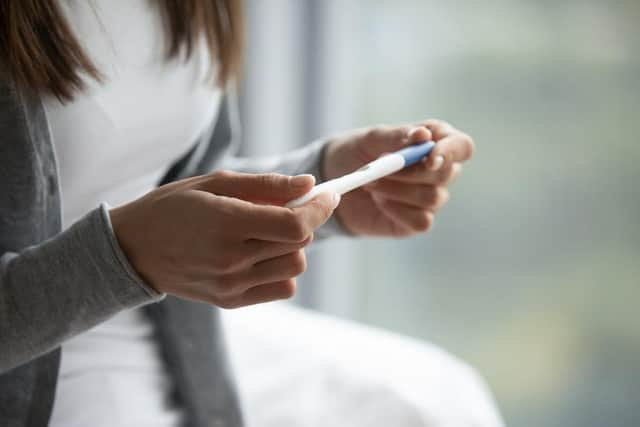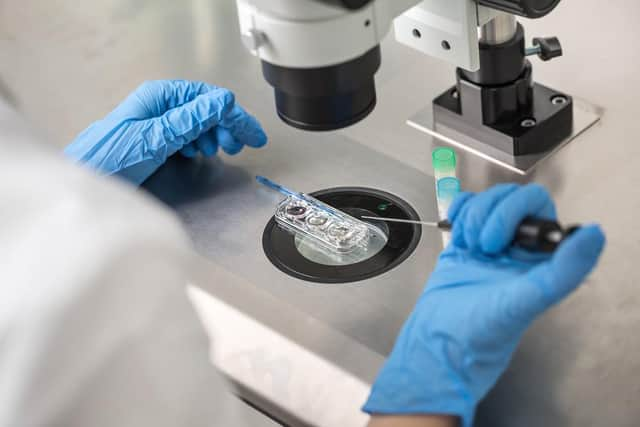What is IVF? How much does the fertility treatment cost in the UK - and process explained
and live on Freeview channel 276
In vitro fertilisation (IVF) is one of several techniques available to help those with fertility problems have a baby.
The number of rounds of IVF funded by the NHS depends on where you live in the UK, and effectiveness can depend on a number of factors.
Advertisement
Hide AdAdvertisement
Hide AdRecent figures released by the Human Fertilisation & Embryology Authority (HFEA) found that IVF birth rates were lowest among black people, particularly those who identified as black African.


But what does IVF involve, who is eligible to receive it and how much can it cost?
Here’s what you need to know.
What is IVF and is it available through the NHS?
During the process of IVF, an egg is removed from the woman's ovaries and fertilised with sperm in a laboratory. The fertilised egg - which is called an embryo - is then returned to the woman's womb in order to grow and develop.


“IVF can be carried out using your eggs and your partner's sperm, or eggs and sperm from donors,” says the NHS.
Advertisement
Hide AdAdvertisement
Hide AdThe National Institute for Health and Care Excellence (NICE) fertility guidelines - which makes recommendations about who should have access to IVF treatment on the NHS in England and Wales - recommends that IVF should be offered to women under the age of 43 who have been trying to get pregnant for two years, or who have had 12 cycles of artificial insemination.
Artificial insemination, or intrauterine insemination (IUI), is a fertility treatment that involves directly inserting sperm into a woman's womb.
According to NICE, women aged under 40 in England and Wales should be offered three cycles of IVF treatment on the NHS if:
- they've been trying to get pregnant through regular unprotected sex for 2 years
Advertisement
Hide AdAdvertisement
Hide Ad- they've not been able to get pregnant after 12 cycles of artificial insemination
“If you turn 40 during treatment, the current cycle will be completed, but further cycles shouldn't be offered,” said the NHS.
The NICE guidelines also say that women aged 40 to 42 should be offered 1 cycle of IVF on the NHS if they meet certain criteria.
The final decision about who can have IVF in England funded by the NHS is made by local clinical commissioning groups (CCGs), and their criteria may be stricter than those that are recommended by NICE.
Advertisement
Hide AdAdvertisement
Hide AdIn Scotland, if all the relevant criteria is fulfilled, women under 40 can have three NHS-funded rounds of IVF treatment, and one between the ages of 40 and 42.
In Northern Ireland, one round of IVF is funded for women aged 42 and under, depending on criteria being met.
How much does IVF cost in the UK?
If you're not eligible for IVF treatment with the NHS, or you decide to pay for IVF, you can have treatment at a private clinic.
Costs vary, but one cycle of treatment may cost up to £5,000 or more and there may be additional costs for medicines, consultations and tests.
Advertisement
Hide AdAdvertisement
Hide AdSome clinics can be contacted directly without seeing your GP first, but others may ask for a referral from your GP.
How effective is IVF?
The success rate of IVF depends on the age of the woman undergoing treatment, as well as the cause of the infertility if this is known.
The NHS says that “younger women are more likely to have a successful pregnancy,” adding that “IVF isn't usually recommended for women over the age of 42 because the chances of a successful pregnancy are thought to be too low.”
However, new figures released by the Human Fertilisation & Embryology Authority (HFEA) found that IVF birth rates were lowest among black people, particularly those who identified as black African.
Advertisement
Hide AdAdvertisement
Hide AdBlack women between the ages of 30-34 had average birth rates per embryo transferred of 23 per cent.
However, white and mixed ethnicity women had the highest birth rates, with average birth rates of 30 per cent.
This was followed by those who identified as an "Other" ethnicity, then Asian women.
Although researchers said the reasons for the variation were not certain, they suggested that factors including socioeconomic-related pre-existing health conditions, such as obesity, may play a part in this.
Another possible factor which the HFEA noted was that fibroids are more common among black women, and this is something which is linked to decreased IVF success.